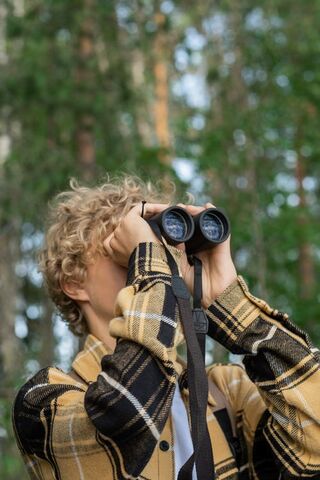Creativity
Why Curiosity Is Necessary for Creativity
Be more curious, and your creative spirit will prosper.
Posted February 11, 2022 Reviewed by Davia Sills
Key points
- Curiosity is a clear foundation fror a more creative life.
- Curiosity is propelled by the desire and freedom to ask questions.
- Creativity is enhanced when we seek answers to divergent and self-initiated questions.
Curiosity is ingrained in our DNA. We are fascinated by the future; we are transfixed with the unknowns that surround us; we are amazed at all that we have to explore. The mysteries of the world have always been an impetus for us to peek and poke and prod for answers—learning something about our surroundings as well as about ourselves. Nowhere is this truer than when we watch the youngest among us—our children.
Children are known for sticking their fingers in places where young fingers should never be. They are famous for putting all manner of objects and substances in their mouths… everything from plastic blocks and the pet dog’s ears to any object in the room not nailed down or sufficiently weighted.
In adults, curiosity guides us toward a lifetime occupation, it drives us to search out potential mates, it stimulates us to travel to new destinations, and it holds our hand as we move into old age and the unknowns of the future. By and large, we are relentless question-askers. We want to know more than we know; we want to expand our horizons, try out the new and undiscovered, and pursue experiences that deepen our comprehension (and appreciation) of the world we live in.
But curiosity is much more than a simple search for answers. It is also the generation of possibilities. When we look at the world from multiple perspectives, we give ourselves permission to examine a wider range of resolutions and remedies. We open up our minds to explore the unexamined and unknown. Curiosity becomes a propellant for new opportunities and new options. Ian Leslie explains it this way: “…curiosity is essential to an exploring mind; it opens our eyes to the new and undiscovered, encouraging us to seek out new experiences and meet new people.”
It was Albert Einstein who famously said, “I have no special talents. I am only passionately curious.” He also went on to say, “The important thing is not to stop questioning. Curiosity has its own reason for existing.” For Einstein, curiosity was the engine that drove his creativity.
Curiosity is the catalyst for questioning, and questioning is what propels us to seek out the unfamiliar and the unknown. Curiosity is the fuel necessary for creativity to prosper and succeed. For, without questions, knowledge becomes stagnant and immovable. It does not move forward, nor does it have sufficient power to poke and peek and prod what may lie just below the surface or just slightly out of reach.

Strategies to enhance curiosity
Try these suggestions to promote creativity.
1. What if...?
For much of our lives, we are predisposed to look for a single solution to a single problem. We have been “brainwashed” to think that for every problem, there is one, and only one, way to solve that problem. Unfortunately, that’s not the case. When we consider that there might be a multitude of potential responses to any problem, we allow ourselves to break out of the “one-problem, one-answer” syndrome and begin to look for a host of potential solutions (and a host of potential ideas).
The strategy known as “What if...?” is a most powerful idea generator. Simply place the two words “What if” in front of questions you might normally pose when confronting a problem or challenge. “What-iffing” stimulates the brain to think in very divergent ways. It also moves you away from a tendency to look for single right answers.
Try some of the following “What if” questions. How many possible responses can you come up with for each one? Don’t think about the quality of your responses (that will severely limit your creativity); just think about the quantity of responses you could generate for each selected query:
- What if cats would come when you called them?
- What if you were required to choose your life expectancy when you reached age 21?
- What if a small red circle appeared in the middle of everyone’s forehead whenever they told a lie?
- What if every college student could be guaranteed a job immediately upon graduation?
- What if a car could be invented that would be immune to any type of accident?
- What if you had a watch that could predict what you would do over the next 24 hours?
- What if you could wash your clothes while still wearing them?
Asking “What if” questions propels us in new directions (cognitively speaking). From a mental standpoint, they help us move “outside the box” into dimensions typically not within our normal field of vision.
2. No wrong questions.
In a Zoom meeting, conference call, monthly department meeting, or any other kind of group discussion, try to avoid asking the following questions: “What is the answer?” or “What is the solution?” By asking those questions, you are severely limiting a multiplicity of responses simply because the group is now focused on finding the answer or the solution… rather than generating a vast array of potential answers or solutions. More appropriate questions might include: “What are some possibilities here?”; “How many different ways can we look at this?”; and “What are some of the impediments we have to overcome?”
In short, ask questions for which there may be a wide variety of responses, rather than questions which limit the number or type of responses. Anecdotal evidence demonstrates that we tend to think based on the types of questions we are asked. If we are only asked questions for which there is the expectation of a single answer, that’s all we’ll get. On the other hand, if we pose questions that might generate a multiplicity of responses, then the collective creativity of the group is enhanced considerably.
References
Leslie, Ian. Curious: The desire to know and why your future depends on it. (New York: Basic Books, 2014).
Fredericks, Anthony D. From Fizzle to Sizzle: The hidden forces crushing your creativity and how you can overcome them. (Indianapolis, IN: Blue River Press, 2022).


